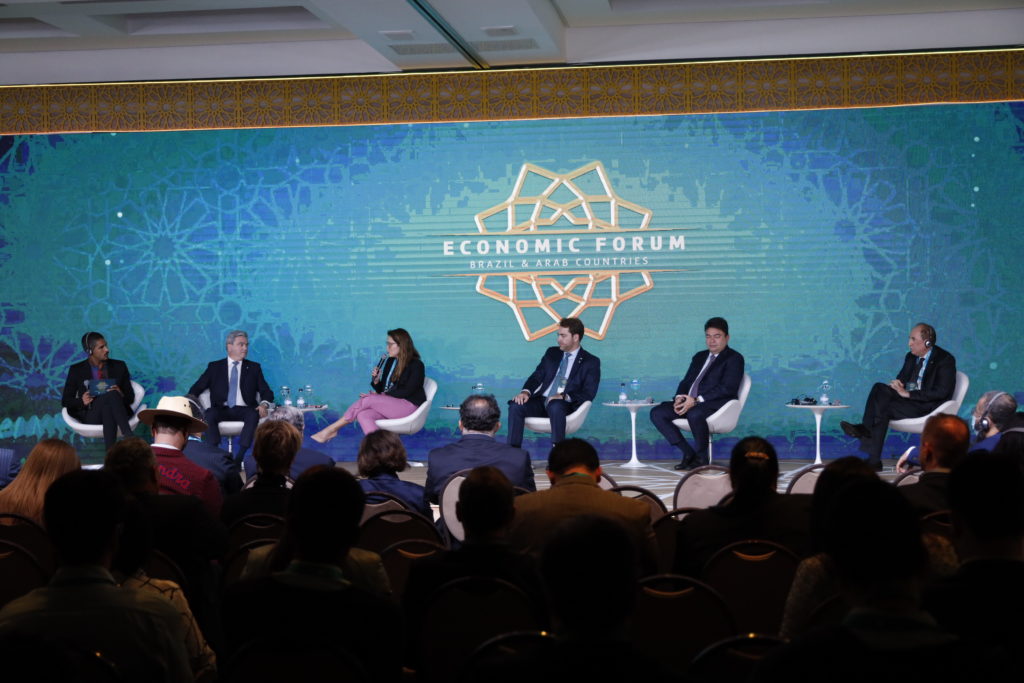São Paulo – “Halal was born ESG; it is only halal if you preserve the environment to produce. It is only halal if effectively [the company] does not have enslaved or child labor. It is only halal if production favors human health; preserving life within the Islamic tradition is imperative. This is our commitment within ESG,” said Ali Hussein El Zoghbi, vice president of the Federation of Muslim Associations of Brazil (Fambras), at the Corporate Governance in International Operations panel.
In the Economic Forum Brazil & Arab Countries schedule, the panel discussed best practices adopted by internationally competitive companies and the challenges of optimal international governance practices. ESG stands for Environmental, Social, and Corporate Governance.
Zoghbi also said, on the social side, Fambras and the certified companies participate in social and aid efforts, serving millions of underprivileged people. “It is important to have a social responsibility in the country where we live,” he declared.
BRF’s global CEO, Lorival Luz, spoke on the company’s presence in the Arab countries, where it has been operating for over 50 years and has two production plants, one in the United Arab Emirates and another in Saudi Arabia. “What is important is the continuity, resilience, and consistency of presence in these countries, ensuring food security and supply for the entire population and working with integrity, compliance, transparency in our relations, strengthening ties and adapting to transformation in consumer habits,” he declared.
BRF is a Brazilian animal protein company that exports to over 120 countries, including the 22 Arab nations, and has around 100,000 employees.
“Brazilian production has sustainability in its DNA,” said Ricardo Santin, president of the Brazilian Association of Animal Protein (ABPA), at the panel. He reported the entire process of animal protein production ensures safety and traceability, respecting halal certification in poultry production. He recalled Brazil is the only major poultry producer with no avian influenza cases.
“Our great challenge is to continue to perform well, respecting the rites of Islamic tradition and guaranteeing food security to the Arab world,” he declared.
The director of international relations of the Brazilian National Confederation of Agriculture and Livestock (CNA), Sueme Mori, said, “Brazil can secure domestic supply and increase its exports respecting good practices [ESG] both from social and environmental standpoints.”
The president of the State of São Paulo Development Bank (Desenvolve SP), Sérgio Gusmão, said, “in terms of governance, Desenvolve SP is prepared for undertakings allowing the mobilization of private capital, with infrastructure projects such as roads, railways, ports, sewage disposal, and other undertakings in which private capital can be invested, and we welcome assets from the Arab world with open arms.” According to him, many sovereign funds in the Arab world already have offices in São Paulo and other Brazilian cities and are investing in these regions.
The Economic Forum Brazil & Arab Countries is held by the ABCC in partnership with the Union of Arab Chambers, supported by the League of Arab States and sponsored by Travel Plus, Brazil Trade and Investment Promotion Agency (ApexBrasil), Fambras Halal, Embraer, Itaipu Technology Park, Pantanal Trading, Embratur, Khalifa Industrial Zone Abu Dhabi (KIZAD), Cdial Halal, Modern Living, BRF, Egyzone/Am Development, Antika/Openet BV, First Abu Dhabi Bank, Egyptian Financial & Industrial Co. (EFIC), Suez Company for Fertilizers Production (SCFP), Boa Esperança Agriculture Cooperative (CAPEBE), Prima Foods, and Afrinvest.
The panel moderator was Palestinian-Kuwaiti journalist Ahmed Shihab-Eldin.
Here’s more on the Economic Forum Brazil & Arab Countries.
Translated by Elúsio Brasileiro




